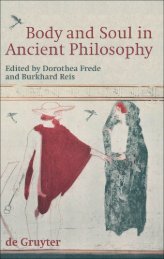[Niall_Livingstone]_A_Commentary_on_Isocrates'_Busiris
[Niall_Livingstone]_A_Commentary_on_Isocrates'_Busiris
[Niall_Livingstone]_A_Commentary_on_Isocrates'_Busiris
Create successful ePaper yourself
Turn your PDF publications into a flip-book with our unique Google optimized e-Paper software.
22 INTRODUCTION<strong>on</strong>ce perfected, was used with great c<strong>on</strong>sistency throughout his career;<strong>Busiris</strong> is thus remarkable in showing striking variati<strong>on</strong>s of style withina very short compass.Neglect of this internal variati<strong>on</strong> has led to an inadequate accountof <strong>Busiris</strong> in Stephen Usher's authoritative work <strong>on</strong> <strong>Isocrates'</strong> style.Usher's verdict is that <strong>Busiris</strong> exemplifies <strong>Isocrates'</strong> 'mature epideicticstyle' as found in Panegyricus, except that the average period lengthis much less; he relates the use of less complex periods to <strong>Isocrates'</strong>promise of brevity and his statement that the theme does not admit(Bus. 9). He suggests further that, if period length is themajor stylistic difference between <strong>Busiris</strong> and Panegyricus, we may inferthat complex periodicity is for Isocrates the supreme distinguishingmark of serious oratory.Usher in fact overstates the average 'shortness' of periods in <strong>Busiris</strong>. 44The figure he gives for his index of period length would ally <strong>Busiris</strong>more with the forensic speeches than with any other epideictic work;the corrected figure, while c<strong>on</strong>firming that periods in <strong>Busiris</strong> aresignificantly shorter <strong>on</strong> average than in, say, the Panegyricus, restoresit to its place am<strong>on</strong>g the epideictic works, with l<strong>on</strong>ger periods thanTo Nicocles and Nicocles.These averages are of limited value, however, in view of the variati<strong>on</strong>within the work. Periods in the Epilogue are extremely short;those in the Prologue and Encomium are much l<strong>on</strong>ger; the Defencefalls somewhere in between. 45 In general, the Encomium has the44 The overstatement arises from numerical errors. Usher's method is to list thenumber of occurrences of each stylistic feature in which he is interested, the numberof Teubner pages of text, and, as an index of comparis<strong>on</strong>, the equivalent numberof occurrences in 25 Teubner pages (i.e. no. of occurrences no. of pages x25). Thus in the case of periods a higher index means more, and hence shorter,periods. For <strong>Busiris</strong>, Usher gives the number of periods as 70, the number of pagesas 10.5, and the comparative index as 189. This last figure must be an error ofcalculati<strong>on</strong>, because 70 10.5 x 25 = 167. This is still not the correct figure,though, because the number of pages in <strong>Busiris</strong> is in fact not 10.5, but a little morethan 11.5: so the correct index is 70 11.5 x 25 = 152. Compare this with Usher'sfigures for some other works: Euth. 205, Helen 136, Paneg. 114, ad Nic. 182, Nic. 180,Archid. 145, Antid. 127. Usher's error as to the number of pages in <strong>Busiris</strong> obviouslyaffects his indices for all stylistic features; his c<strong>on</strong>clusi<strong>on</strong> that it represents the 'matureepideictic style' still holds, but most be modified to take account of variati<strong>on</strong> withinthe work.4jIndices using Usher's method (bearing in mind that these are very short samplesof text): Prologue 109, Encomium 135, Defence 158, Epilogue 234. (Prologue:10 periods in 2.3 pages, 10 -s- 2.3 x 25 = 109; Encomium: 26 periods in 4.8 pages,


![[Niall_Livingstone]_A_Commentary_on_Isocrates'_Busiris](https://img.yumpu.com/51449110/35/500x640/niall-livingstone-a-commentary-on-isocrates-busiris.jpg)




![[Richard_Sorabji]_Self__Ancient_and_Modern_Insigh(BookFi.org)](https://img.yumpu.com/30857691/1/174x260/richard-sorabji-self-ancient-and-modern-insighbookfiorg.jpg?quality=85)





